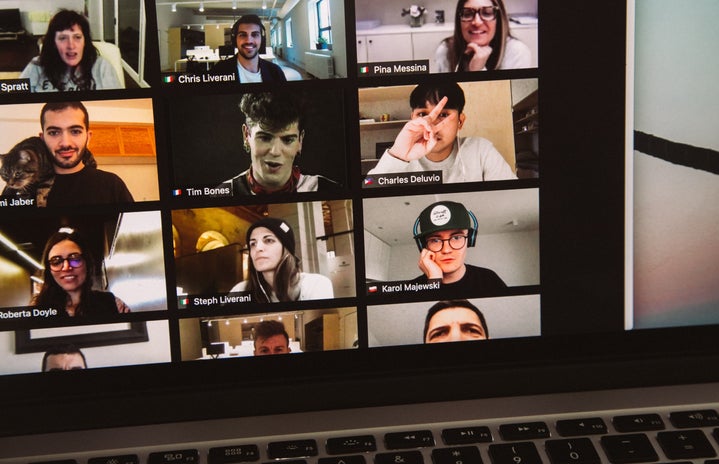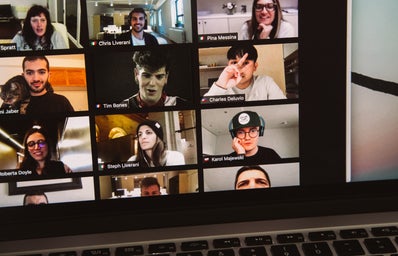Love and Information Program: “Someone sneezes. Someone can’t get a signal. Someone won’t answer the door. Someone put an elephant on the stairs. Someone’s not ready to talk. Someone is her brother’s mother. Someone hates irrational numbers. Someone told the police. Someone got a message from the traffic light. Someone’s never felt like this before. In this fast-moving kaleidoscope, more than a hundred characters try to make sense of what they know.”
While watching from the comfort of my self-made sofa (throwing a blanket & some pillows over an extra bed), I came to appreciate the work that went into creating a play of such an abstract nature. On Saturday, October 17th at 7:30 pm I buckled down in my dorm room, not knowing exactly what I was about to see. What I saw in the next hour and 45 minutes was shocking, while at the same time entertaining. The play being performed on the screen right in front of me was UW Drama’s first CabLab of 2020-21, Love and Information, written by Caryl Churchill and directed by Andrew Coopman.
The play consisted of a kaleidoscope collection of short scenes that each focused on knowledge, technology, communication, and our ability to love. With seven main sections, there were scenes that were sometimes less than a minute, and others that allowed for deeper conversations to emerge. However, the play could be confusing at times since none of the characters were named. You may expect from a zoom production would help keep track of characters, but this wasn’t the case. In this play, the words and actions of the characters were more important than who they actually were. As an audience member, I found myself getting lost at times wondering how certain scenes connected to one another, but by the end, I realized they were all woven together by common themes, not common events or characters.
The play opens with two girls arguing about the similarities that they share with a guy and how much they know personally about him. Then, they realize neither of them knows what his favorite smell is, deciding that they have to find out or they won’t be able to sleep. The word sleep then pops up on the zoom screen to denote a change of scene. Someone can’t sleep and another person recommends hot milk or just lying there and breathing. With their head too full of stuff, they just decide to get up and go on Facebook. The opening word for the next scene is titled depression, a short phrase is uttered, and the scene cuts to the word remote.
One of my favorite scenes was in the lab, when the scientist on the zoom call has the sound of chicks chirping in the background. She says that in 12 weeks they will be plucked and on your table. During all of this, the scientist is being interviewed with probing questions while the chicks peck at beds that have been dipped in water or something that tastes bitter. Her colleague injects radioactive liquid into each side of the chick’s brain. The scientist then goes on to explain how she beheads the chickens to examine their brain and see their memory changes. This scene with all the scientific jargon used made me really start to wonder, what is information without love?
This play is powerful because it meets at the crossroads between love and information. Striking a balance between needing to love and needing to know. Information that makes us human such as our feelings, dreams, and minds are disappearing in a world dominated by different types of information. The scenes that we see throughout the play are snapshots of ourselves and it is ultimately up to us to decide what we make of it.


